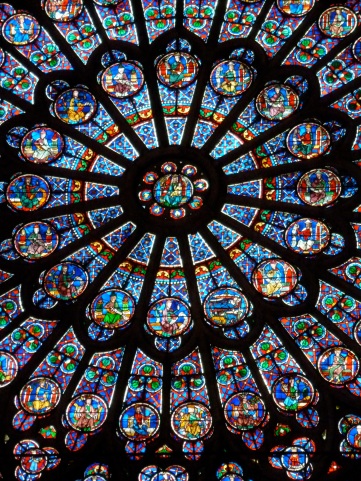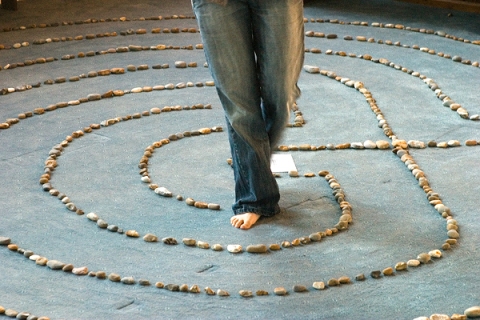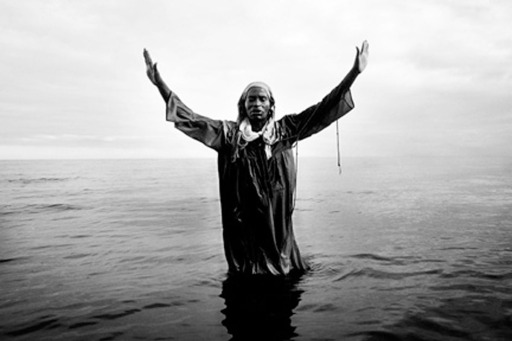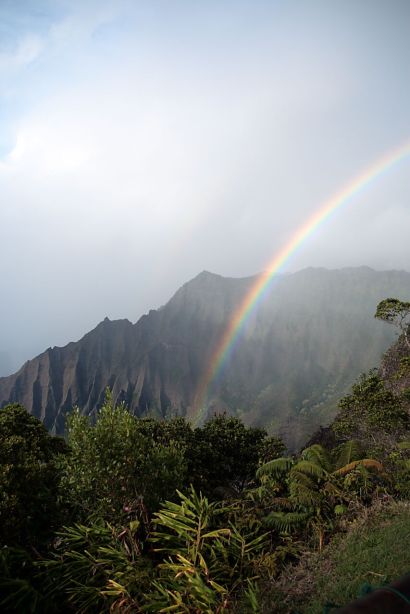In the summer of 2013, my colleague Cort Worthington and I convened a 3-day inquiry into the many connections between Improvisation and Spirituality. We were joined at the Green Gulch Zen Center north of San Francisco by nine other wonderful improvisors. This post marks the first in a three-part series sharing some continuing reflections from that collaboration.
For new, specific exercises that integrate improv and spiritual practice, please see my earlier A Deeper Kind of Play post or check out the third post in this series .
I look forward to hearing your thoughts in return and to continuing this rich exploration!
* * * * *
Author E.B. White once famously quipped that:
Analyzing humor is like dissecting a frog. Few people are interested and the frog dies of it.
One could say something similar about trying to define the elusive term “spirituality.” Perhaps the word’s less a frog and more a chameleon—changing colors depending on who does the defining—but it, too, might suffer from close examination. Why drain the life from the term? Why not just let it go and live it out? As Chinese sages have recognized for centuries, The Tao that can be named is not the true Tao.

I am the Chameleon you call Spirituality. Watch me change.
Photo courtesy of www.angiwallacephotography.com
However clever, though, White’s quip misses the value of exploring a word in greater depth. To start, people do show interest in spirituality, perhaps more than ever. Furthermore, a good dissection teaches about the structures of anatomy and physiology. We learn about our own insides by proxy, and more of what makes us work. And so it is with spirituality. Those of us who want to connect others to–and connect with others in–ineffable springs of meaning need to develop a shared language. We may never have an exact or all-encompassing, absolute definition of SPIRITUALITY, but we can generate a working approximation. We can lay some stakes in the ground to mark a foundation. Even if we cannot fully name the Complete Truth, we can at least begin to approach it.
For starters, we can distinguish spirituality from religion. From the word’s roots, we can say that religion represents a shared institution of beliefs, rituals, and practices that “tie us back” (from religio—to tie, or bind) from our failings and to something greater. Religion creates a community that offers support, correction, and celebration for the ups and downs of life’s uncertain experience. That togetherness can lead to incredible power and creativity, as demonstrated by houses of worship, religious art, and sacred music of all sorts.
Though spirituality can serve some of those same functions—especially when we sense our own in synch with another’s—spirituality seems to suggest a more fluid personal experience of that Mystery rather than a structured dogma around it. Religion provides a vehicle for collective spiritual expression.
When our workshop group responded to the prompt “For me, spirituality means…,” we got a wide range of responses. Laid side by side, however, those many images began to create patterns that in turn suggested a mood: wholeness in the face of paradox. Awareness in the present that bridges past and future. Alignment between inner wisdom and outer action. I include the list below.
“For Me, Spirituality Means…”
Notes from Improvisation and Spirituality Workshop
July 7-10, 2013
play…kindness….being awake….active participation in the world….a code of truthful living….awareness….engaging with mystery….100% commitment….
saying“no” to what’s wrong or doesn’t match my knowing….what leads to balance….what is inside us….different colors of light on the spectrum….listening and watching for life’s offers—and then acting on them….making choices….
faith that the positive pays off….being and doing….being in tune….
finding the genius in myself….honoring my connection to the past….
nourishing generous connection….searching….saying “yes” to everything
around you and saying “yes and” to the truth of what you are….
living my essence….being in love with all….finding our fire….honoring the power of words….presence….“my deal.”…the past, present, and future coalescing….
crying a little….an athletic readiness to engage with what’s happening and lightly held preparation for what might happen next….stillness and movement….religion….
not religion….witnessing….strength in vulnerability….holding or standing in paradox….breath….the subjective realm (and the greater than subjective)….
learning to love….finding or creating beauty in the process….meaningful work….
being part of a team….advocating for the shadow side, for what others see as unlovable….bringing the insides forward….dance….
having or finding a comfort with not knowing….new possibilities….searching….
having fun….taking responsibility for how I show up….
a path to enlightenment….strengthening the core….
shifting stuff in the world….accepting the reality of what is so.
Them’s some real fruits! When I distill the ripe harvest down to a more manageable serving, I find sweet potential in the following working definition for spirituality:
The whole-person practice of awakening, feeling, and expressing
a connection to larger Mystery and deeper meaning.
In more detail, this definition suggests:
Whole-person —including all of one’s Self, the chosen and the given, the presentable and the shameful.
Practice—an ongoing and intentional commitment, as in expression of faith or preparation for performance. In this case, we practice to improve our humor, our compassion, our resilience.
Awakening—emerging from the trance of separation, consciously choosing to bring what’s laid dormant to life.
Feeling—a subjective experience that includes thoughts and emotions, body heart and mind.
Expressing—giving voice to joy, despair, wonder, curiosity and whatever else one finds inside.
Connection—recognizing that our lives intertwine with our world and the many others in it. As Zen master Thich Nhat Hanh says, we inter-be.
Larger Mystery—Life, Love, Light, God, or the unseen world. It could be Reality. Whatever name we choose, it contains a recognition that we live as part of something greater than our smaller egoic selves.
Deeper Meaning—what really matters to us, our sense of purpose and belonging.
Now that definition forms a foundation we can build on. Now we can start a conversation.
* * * * *
Given our workshop cohort’s careful attention to laying out the boundaries of our sense of spirituality, I find it funny that we allotted no time for defining the word improvisation. As experienced improvisors, we assumed a language in common. In retrospect, that assumption probably remained a safe one—I never had the sense of worldviews colliding in our conversations—but I wouldn’t bet my life on it.
For clarity’s sake, I’ll say that, for me, improvisation means…
The in-the-moment art of active creating in relationship to the many offers coming from one’s inner life and from the immediately surrounding people and circumstances.
Improvisation can come as dance or as music. It can take the shape of invention or problem-solving. Most often, I speak about and learn from improv through the lens of theater. In the end, of course, improvisation plays out in most moments and every arena of our lives. We wake up and have to make choices given the conditions placed before us. As comedian and improvisor extraordinaire Stephen Colbert pointed out during his 2011 commencement address at Northwestern University:
You are about to start the greatest improvisation of all. With no script. [With] no idea what’s going to happen, often with people and places you have never seen before. And you are not in control.[1]
We all improvise. The question is: will we learn to improvise skillfully and in a way that satisfies our spiritual longing?
Part 2 of this 3-part post will explore the more conventional and non-controversial intersections between improvisation and spiritual practice: staying present, being kind to those around us, taming the internal critic, and the like.
Part 3 will dive into the more unconventional or speculative links between the two. When we improvise, where do our ideas come from? Are we expressing a shared intelligence and if so, which one? In what ways do we create shared ritual with our audiences?
Click the hyperlinks to read more.
[1] Colbert concluded his speech with an improv exhortation: So say “yes.” And if you’re lucky, you’ll find people who will say “yes” back.





Ted, thanks for this–beautiful. I am reading it in a cottage in West Cork Ireland that two faculty friends from Exeter have rented with me. We have fallen into a kind of what integral philosophy calls (a bit awkwardly) “we-space” –though if I were to tell my friends that it would immediately highlight it in a way I don’t particularly want to do. Much to say about it but one facet is improv–again, not using the word. The little funny things–walking into what was decribed as an art gallery and finding four chairs back to back in a little square–and nothing else. Turned out the exhibition had just been taken down, but immediately two of us went into a comical five minute riff on the chair “exhibit,” matched only by the expression of our third friend when she came in. Many times these moments have happened, though I have not called attention to them. Something about the EB White quote is right here, but it does have do with engaging the immediate circumstances, and on my part at least a semi-conscious willingness or decision to step into a larger frame without specific anticipation. Definitely feels like it comes from a different part of my brain. Interesting that I have no desire to have this conversation with my friends right now–maybe toward the end. But I love your discussion of it–the workshop sounds fantastic. Lots of love–Kathy
Hello, Kathy. What a wonderful place to be reading blog posts!
I love how you articulate that space of just wanting to let things be without needing to name them. Sometimes the naming of them makes them slip away, like we need to keep them in our peripheral vision if we want their company.
I sometimes wonder what says about mindfulness. Does bringing our observer awareness to every corner of our lives make any parts of ourselves skitter back into the corners from shyness? I honestly don’t know the answer but you’ve got me wondering some more….
Thank you for sharing your thoughts. I look forward to reconnecting in person at some point this fall!
T
Seems like that is part of the paradoxical nature–the finger pointing to the moon. Language often gets us too focused on the finger, but we need some way to point. Just got home last night, and my threesome never did talk too much about this though I read them the list above late one night–sort of wanted to drop it into the space without making it an object lesson. Both liked it but it’s unfamiliar territory for them–one a great math teacher and the other an artist. They consider me the “deep thinker.” 🙂 –but there is definitely a shared intelligence at work, and I think it is worth naming just as Gardner’s forms of intelligence were worth naming–partly you’re defining more of what he called spiritual intelligence. Very much relatiional, to each other and to different parts of the self. Really makes me consider that interface between a kind of intimate space and consciousness of it. So interesting. The interweaving of the cognitive and non- cognitive. The paradox we live–and consciousness of that. Look forward to seeing you whenever, and to your next posts.
that’s a though one…Since I don’t feel myself like a “spiritual one”, at the moment being spiritual, for me is being engaged on the task. I’ve a good conversation with Francesca (my partner) yesterday. We were discussing where you realize mindfulness: in which part of the task? Let’s say I’m driving. I’m not aware of every single movement my body is doing while accomplishing the task (it would be impossible) so where do I focus my mind to be present in the moment? Looking at the road? Being aware of the wheel? I think mindfulness (and spirituality) realize themselves when you are aware and conscious and mindful at the goal. it’s like when you’re clicker training your dog: you’re looking for every single step towards the final behavior. The attention to the goal compell you to being mindful at every moment you are engaged in the training process. Like you wrote in your experience with the cat (Alex?): you know what your final goal was (to sleep in the morning) and you have take -mindfully- all the steps needed: give the cat more water.
The thought of defining improvisation is so interesting. Might we all have different definitions of that? It hadn’t even occurred to me! And while we did spend some time thinking about what spirituality means, I wouldn’t say we collectively came up with a definition of it that we agreed upon and used.
I liked your definition of spirituality. And thinking about defining it is helpful to me so that I have an idea – maybe just a starting place – of how to live in a way that feels Right to me. Even if the thought process ends in knowing that it’s undefinable in words, but not in feeling. And then the task — the practice — becomes making choices to bring about the right feelings, whether you can name or explain them or not.
Thank you, again, for the workshop. For creating the space for this type of exploration. And for the post.
love,
Lisa
I love the way you’ve said this, Lisa: “…the task — the practice — becomes making choices to bring about the right feelings, whether you can name or explain them or not.”
That articulates well what I hope to do: acknowledge the necessary ambiguity of words while still being intentional about bringing about the experience. Yes, yes, yes.
And I imagine everyone would define improvisation, like spirituality, with their own tweaks and subtleties. A flock of such definitions would probably start to form an accurate representation of what the word actually “means.”
The older I get the more I appreciate that the Universe is full of new ideas every second, which we, as improvisers tap into when we “decide” to be onstage and “create.” My mindfulness is to take that deep breath, smile at the universe, and say, “yes, and…” with every encounter, both on and offstage.
Well said, Candy. Every moment a decision, every moment a creation.